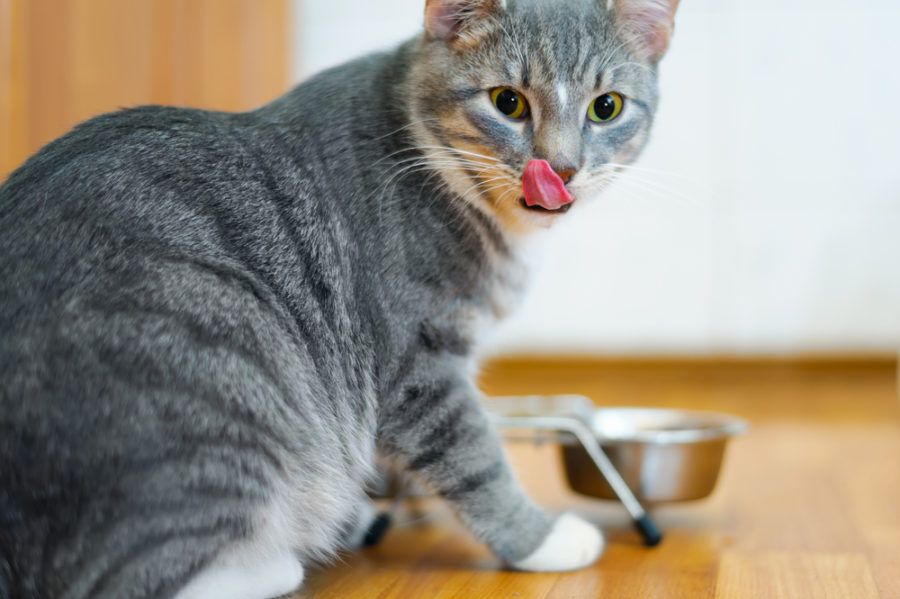While there’s no cure for Chronic Kidney Disease (CKD), there are a number of ways you can tweak your cat’s diet to help manage her symptoms.
If your cat has Chronic Kidney Disease (CKD), diet is everything. “One in three cats over the age of 10 will be diagnosed with this illness, so all you can do as a cat parent is put in place good kidney supporting practices that will promote good kidney health (and thereby reduce the chances),” says Anuj Kotecha from Scruffy Paws Nutrition. He recommends checking for early signs of CKD, ensuring your cat is properly hydrated, avoiding dry food, and supplementing with kidney supporting supplements.
Signs of CKD in cats
There are a number of signs that a cat might have chronic kidney disease. Early on, they can be difficult to recognize, but as the disease progresses the signs become more obvious. Here are some things to watch for:
- Changes in daily routine and behaviour – This can include odd sleeping habits, litterbox issues, increased thirst, and lack of appetite.
- Weight loss – “Regularly run your hands all over your cat’s body to get a good feel for what her normal body condition is like,” says Anuj. “This will help you notice any weight changes.”
- Dehydration – Because CKD causes cats to urinate a lot more than usual, they are at severe risk of becoming fatally dehydrated. Be sure to check your kitty’s paws for cracks, and be aware of bad breath, itchy skin and dandruff. “If you take a pinch of skin over the cat’s shoulders and pull up gently, the skin should snap back into place when released,” says Anuj. “If the pinch of skin stays up (the “tent”), it is a sign of severe dehydration. The cat should be seen by a veterinarian immediately.”
- Mouth ulcers– When your cat’s kidneys can efficiently remove toxins for the body, it can result in mouth ulcers. Check her mouth regularly and watch to make sure she isn’t in pain when she eats.
What to feed cats with CKD
Your vet should be the first one you talk to if you suspect your cat has CKD. He or she will likely recommend a kidney prescription diet – a food that contains less protein and phosphorus than traditional diets, which will reduce the strain on the kidneys. Do some research into the brand your vet suggests, and don’t be afraid to ask about other options.
Tip: One of the most important things you can do for felines with CKD is to ensure they stay hydrated. Feed a vet-recommended wet or raw food and add an all-natural flavor additive to her water if she’s reluctant to drink.
If your cat turns her nose up at the new food, try warming it slightly or add a bit of low-sodium tuna water to her meals to increase the flavour profile.
Supplementation
Though feeding a high-quality, well-balanced diet is the first step for cats with CKD, adding a few supplements to her daily meals can also help. B vitamins, for example, are lost in your cat’s urine which can result in loss of appetite or anaemia, so supplementing this micronutrient can largely improve your cat’s quality of life.
It’s also important to take steps to manage proteinuria – abnormal presence of protein in the urine. “This is dangerous and makes CKD progress faster,” says Anuj. “I recommend supplementing your cat with the Scruffy Paws Kidney Vitalize chews. They contain active ingredients that have been scientifically backed to reduce proteinuria, thus reducing the progression of CKD.”
Tip: When shopping for supplements, look for herbal ingredients such as Astragalus and Rhemannia extracts, and pay close attention to the scientific backing behind the ingredients.
On top of the proper supplementation, take steps to reduce the amount of protein in your cats’ diet (focus on quality over quantity), and ask your vet whether certain medications, such as ACE inhibitors and ARBs may help.
With the proper care and a bit of luck, cats suffering from CKD can live long, happy lives. Use your vet as a resource, make quality nutrition a priority, and make sure your feline companion gets plenty of love![adning id=”36084″]








